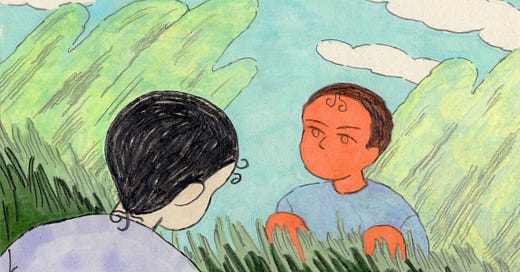Hey all,
Welcome to Human Nature, the illustrated psychology newsletter.
We’re on to the penultimate post in the current series on mental disorders. Today we’re going to be discussing bipolar disorder.
Bipolar disorder
What it is: Bipolar disorder is a mood disorder characterised by shifts between intense states of depression and intense states of elevated mood, called mania. Patients suffer from recurring depressive, manic or mixed episodes, which get in the way of their day to day functioning and impact their relationships and work.
Symptoms of a manic episode include: feeling elated or highly sensitive, high energy levels, talking fast and jumping from one topic to another, reward seeking behaviour, and feelings of grandeur. Symptoms of a depressive episode look a lot like depression and include: low mood, trouble concentrating or making decisions, loss of pleasure and motivation, and feelings of hopelessness.
There are two main types of bipolar disorder. Bipolar I, which is characterised by episodes of mania lasting at least seven days followed by depressive episodes lasting around two weeks, and Bipolar II, which is also defined by cyclical episodes, but the manic episodes are less severe than in Bipolar I and are referred to as hypomanic.
How it works: Like most mental disorders, there isn’t a single cause of bipolar disorder. Although it runs in families, not everyone who has a parent with bipolar disorder will develop it. There are also environmental factors at play, with childhood trauma, adverse life events and substance misuse all contributing to the development of the disorder.
Treatment: Bipolar disorder is treated using a combination of medication and psychotherapy, usually CBT. Medication for bipolar disorder includes: antipsychotics, anti-convulsants, anti-depressants and lithium. The medication that is prescribed will depend on a variety of factors including the current episode the patient is experiencing, the severity of the symptoms and the patient’s health.
Thank you for reading, see you next time.
If you are struggling with your mental health, please seek the advice or support of your GP. You can call the Samaritans 24/7 for free emotional support: 116 123. If you are having thoughts of suicide, call 999.
Sources:
Bipolar Disorder, National Institute of Mental Health.





